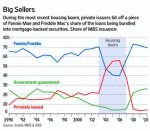Not directly yes, but indirectly they are.
So you retract now your silly claim that
Fannie and Freddy were certainly lending to people who were subprime, and now recognize that Fannie and Freddie don't actually lend to anybody at all. Good.
They are the ones who provide funding for lenders by buying mortages...
Selling off part of a mortgage portfolio is one among many ways in which lending institutions obtain funds to lend. They do the same thing with credit card and auto loan debt that they might hold for instance. Then there is the entirely separate market for commercial real estate. The list goes on, but no matter how they raise the funds, it is still the banks that do the lending.
...hence they are the ones who set the standards. And then they repackage them and sell them to the investors.
Yes, unlike Wall Street, the GSE's set minimum underwriting standards for the loans they will agree to purchase. They always have done that and still do.
Well, then you supported the policies that lead to the crisis.
That's rich. Pointing out that loan standards TODAY are too tight has some affect on events in 2008 and earlier? I don't really think so.
Do you know what subprimie mortages is? Subprime mortages are mortages from people who do not qualify. You just said you agreed with such loans.
Absolutely, but it is most definitely you that is confused. Subprime is simply everything that does not qualify as prime/conventional according to GSE-set standards. The finance companies (Household, Beneficial, etc) had been making tidy profits for decades serving these markets that traditional lenders through red-lining and other questionable practices had turned their backs on. But the finance companies made their money through payday-lender type terms of extortion. It's not like their customers had any place else to go. But they did have someplace else to go in the 1990's when Clinton made an acceptable CRA rating a condition for approval of new applications for acquisitions and interstate banking operations. CRA required that consistent with sound business practices, banks and S&L's taking federal deposit insurance had to make serious efforts to lend into the communities that they were taking deposits from. No more sucking all the savings out of urban low- and moderate income communities and using them all to build gated golf course communities in the upscale suburbs. They didn't have to make any actual loans at all. They merely had to make serious efforts to find qualified borrowers. Traditional lenders balked at first, but they were soon somewhat astonished as nearly half of the new borrowers they were able to unearth right next door were qualified at prime terms and nearly all the rest at Alt-A, the level down just a hair from prime. It is not hard to make a profit from lending to such populations, and with very few adjustments to terms for those in the Alt-A group, a substantial portfolio of CRA loans was soon built up that performed better than industry averages. Lending into these previously underserved or unserved markets turned out to be both good policy and good business.
The success of these loans -- both prime and subprime -- led to a situation remisicent of the Oklahoma Land Rush. Everyone wanted a piece of those profits, and subprime in particular became a market that everyone was interested in. The GSE's for their part were busy designing model credit types for these markets -- typically a 30-year fixed-rate instrument with front-loaded fees and premiums that borrowers could earn their way out of through solid loan performance. But Wall Street and their broker-henchmen had other ideas. Ideas like teaser rates, no-cap ARM's, interest-only, and reverse-amortization. They packed their loans with all sorts of gimmicks, put the hard-sell on those products into subprime and other markets, then sold the slop they were generating off through Wall Street and into the secondary markets. That's where the problems came from.
Subprime markets did and still do hold great potential for profitability. They were not the problem. Market abuse and predatory lending by cowboy capitalists were the problem, particularly as the quality of borrower they were dragging in kept falling to new lows. That plus regulators somehow convinced that markets were wise enough to regulate themselves.
I never said nationalize. The government certainly shouldn't have full control of the banks. However, there should be regulations of banks, and there should be national lending standards.
It doesn't matter whether you use the word or not. When you want the federal government to take over and dictate work that banks do now, you are nationalizing them. Of course, nationalization of the banking system was one option back in 2009, and quite a number of people will still say that we missed the boat in not doing so. They point out that the recovery would have been easier, quicker, and more robust under such a scenario, and it is very hard to argue with that premise. The kicker however is that it is very hard to re-privatize a banking system once you have nationalized it. That was the biggest sticking point, and it was a very valid one indeed.
Problem is your argument for this being a republican enterprise is that the tax cuts led to cut in interest rates, but the tax cuts happened after the cuts in the interest rates. People would get their rebate check by December 2001. By then the interest rate was already dropped from 6% to 2%.
This amounts to already debunked babbling. The credit crisis was a child of the years 2002 to 2006. Democrats were in charge of nothing over that interval. It was all Bush and the neocons (all now reconstructed as lifelong "libertarians" it seems) who were responsible for this mess, lock, stock, and barrel. Cowboy capitalism met blind, laissez-faire, free-marketeerism, and this is the result we got.

